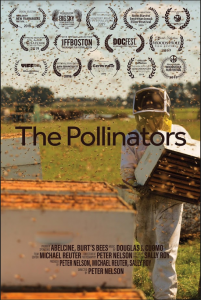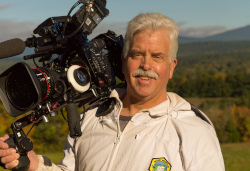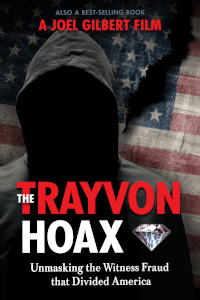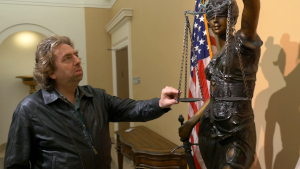Posted by Elena del Valle on October 30, 2019

The Pollinators poster
Cinematographer Peter Nelson dedicated countless hours to filming bees, traveling to 14 states, following bee managers and their bees; and interviewing 26 people in the making of The Pollinators, a 92-minute film about bees and their role in agriculture today. Its festival premiere was at the Big Sky Documentary Film Festival. To date it has been screened at 18 festivals. He has already taken home seven festival awards. Scroll down to watch a trailer for The Pollinators*.
When asked by email what prompted him to make a film now he said, “I am a backyard beekeeper for over 30 years now and also a cinematographer by profession. I also have a great interest in food and agriculture and felt the story of migratory beekeepers and our dependence upon managed honey bees was not well known I was compelled to tell this story due to a collisions of all these passions.
Losses among commercial beekeepers are very high and range from 30 to 50 percent or more. This is not sustainable long term and this matters to all of us because us our dependence upon the managed bees for so much of our food. One of every three bites is something pollinated by a bee, so this is really important if you like to eat. We are in a time of peril for the bees (and also many other insects) and I wanted to take a look at this and tell this story.”
The target audience? Beekeepers, of course as well as people interested in the environment, farming, foodies and gardeners. The film includes bee close ups and beautiful images of the insects in flight as well as disturbing shots of thousands of dead bees.

Peter Nelson, director, The Pollinators
“Filming bees was a challenge, but also a lot of fun,” the filmmaker said. “I wanted to try and show bees in a way I had not really seen before as the wonderful beautiful insects they are. Many people are afraid of bees and I understand that as they are a stinging insect. Unlike yellow jackets, honey bees will sting only as a last resort and they die in the process so honey bees are not aggressive for the most part. Honey bees are also incredibly beautiful and complex creatures and I wanted to try and show bees to audiences in a new way and share how wonderful and graceful honey bees really are. I used a lot of very high speed photography (up to 1560 frames per second) to show bees in super slow motion flying, taking off, landing and just being beautiful in their natural environment.
Bees fly really fast and so are very challenging to film, especially in macro close up. My experience as a beekeeper for many years, gave me an advantage with this by understanding a bit about bee behaviors and the way they fly, land and their rhythms to some extent. It also required a lot of patience and a steady hand to keep the bees in focus at such shallow depth of fields.
I used Vision Research Phantom cameras and macro lenses provided by AbelCine for the ultra slow motion. The specialty cameras were provided by AbelCine as part of a grant for this project. My main camera was a Canon c300 Mk II and a 17-120 cinema zoom which I own and also some prime lenses for night. I also cannibalized one of my backyard bee hives to be able to stick a lens right inside the hive for a unique view of the bees inside their homes.”
Regarding funding and support he said, “We have a tremendous amount of sweat equity and some personal funding in the film. Being a cinematographer, I could go shoot pretty much as I needed to so was able to respond quickly to developments and shoot as needed. We also had some early financial support from Burt’s Bees, The Schumann Media Center helped us with funding. We also won a Doc Pitch competition from the Paley Center.
AbelCine gave us an ‘in-kind’ grant towards specialty camera equipment and lenses. Michael Reuter, the editor, producer and co-owner of EditBar helped us tremendously in post production right through completion.”
The only people who were paid were crew members for their services, he said, and no one who appears in the film was compensated in any way for his or her appearance nor was anyone paid for access.
“I wanted to bring this important story to audiences, to try and connect people to their food, where it comes from and a bit of what is involved in growing it,” he said when asked what he hoped to accomplish. “I also wanted to raise awareness and try to explain some of the causes of pollinator decline. If we can connect dots for people about the role of pollinators to our food system in some way, I would consider that a success.”
The producers were Sally Roy, Peter Nelson and Michael Reuter. Nelson was director of photography. At the time of this writing the project leaders were starting a theatrical release through Demand.Film, a crowd sourced distribution platform designed to make films available to cinemas across the United States, Canada, Australia, New Zealand, United Kingdom, Ireland and Germany over the next months. The goal is for the film to screen in one day events across the country in many places that would not likely screen independent documentaries. A national day of screenings is planned for Nov 6, 2019 in the United States (more at //us.demand.film/the-pollinators/). Broadcast, streaming, video on demand (VOD) and educational distribution venues have not been determined yet.
*Photos, video: Poster image and video courtesy of Peter Nelson, photo of Peter Nelson courtesy of Eric Krieger
Posted by Elena del Valle on October 24, 2019
If social media is your passion, consider joining our University at Buffalo team to create an engaging social presence that reflects the UB brand and deepens our relationships with our audiences, creating opportunities for them to engage and share their pride. We are looking for an outstanding candidate to manage Click to read the entire Job Ad Social Media Specialist, University Communications, University at Buffalo
Posted by Elena del Valle on October 23, 2019

The Trayvon Hoax
Photos, video: Highway 61 Entertainment
Los Angeles based filmmaker Joel Gilbert set out to produce a documentary about the rise of Andrew Gillum, a past Florida gubernatorial candidate. He ended up writing a book and making a film about the death of Trayvon Martin and the trial of George Zimmerman in Sanford, Florida. The world premiere debut of The Trayvon Hoax: Unmasking the Witness Fraud that Divided America, a two-hour film, was at The National Press Club in Washington DC September 16, 2019. Scroll down to watch a video clip of the film.
When asked by email what prompted him to search this topic, write a book and make a film the director said, “I had followed the 2012 shooting death of seventeen-year-old Trayvon Martin and the subsequent trial of George Zimmerman from afar and, like many others, I had grave concerns about the lynch mob mentality that drove the case. Only after I started researching the project did I realize I had stumbled into the most spectacular case of identity fraud in modern American judicial history. The fraud resulted in the seminal race hoax of the Obama years. I call it ‘The Trayvon Hoax.’ It is appalling that six years after the Zimmerman trial so much information was left for me, an independent filmmaker, to discover. If the media had wanted to find the truth, it was there for the plucking. I was able to uncover it simply by reading publicly available information from the legal proceedings and following up on what I read. How is it possible no one in the media chose to do what I did? The answer is simple. The media did not want to know. The truth would not have advanced their fear-fueled racial agenda.
The Zimmerman trial literally divided America. Prior to the trial in 2012, both blacks and whites rated race relations as positive. This has been negative ever since. It lead directly to the ‘Ferguson Effect,’ a crime disaster for black neighborhoods with homicides up 33 percent. Also, the modern era of fake news and race hoaxes started with this case. Nothing has been more damaging to the United States than this trial and no one has suffered more from this ongoing hoax than the black youth of America.”
It took about 11 months to complete the film and book project, the author said. He dedicated the first five months to the investigation and filming. The next six months were for film editing and writing the 272-page book. He declined to disclose the budget or the source of funding for his project, saying, “We are a private independent film production company and we don’t disclose our budgets related to any project. However, there was no third party funding or donations for this film.”
“This Trayvon Martin shooting and Zimmerman case is still talked about and on everyone’s mind,” the filmmaker said when asked why he thinks the topic is relevant today, years after the trial took place. “Its why Black Lives Matter was formed. Presidential candidate Kamala Harris recently tweeted that Trayvon Martin started a movement. Well, that movement led to massive racial division and harm in America, all because of a fake witness. All the fake news and race hoaxes that continue to this day started with the Zimmerman trial, it was ground zero. Also, Sybrina Fulton, Trayvon Martin’s mother, is running for Miami-Dade Commissioner. The film provides evidence that Ms. Fulton knew about the fake witness in the case, but allowed it to go forward anyway. She did not alert the media or the judge even though she knew Rachel Jeantel was not Diamond Eugene as she claimed to be. Ms. Fulton was just endorsed by Hillary Clinton on Twitter who asked her 25 million followers to contribute to her campaign. Corey Booker endorsed her as well. I have no doubt that the Democrats are planning to bring Ms. Fulton to the Democrat convention once again in 2020 to help push their race based narratives of ‘black-men-are-targeted-by-racist-whites and cops’ to try to secure 95 percent of the black vote.”
When asked if he compensated Zimmerman (or anyone else) in any way for the on camera interview he replied, “As is customary for interviews with public figures who are featured in documentaries in extended interviews, Zimmerman was paid an appearance fee for his time. Zimmerman did not testify in his own trial, so The Trayvon Hoax: Unmasking the Witness Fraud that Divided America provides his account for the first time.”

Joel Gilbert in a scene from the film
To the question “Did you reach out to the teenager’s family, Zimmerman’s attorney, the prosecutor, witnesses such as Martin’s girlfriend who testified or anyone involved with the case (other than Zimmerman’s on camera interviews) to ask for their comments on your findings?” he replied, “I reached out to Zimmerman’s attorneys early on and got some help with background questions mostly. Mark O’Mara initially expressed skepticism that Rachel Jeantel was a fraud. “She was such a terrible witness,” he told me rhetorically, “why would anyone use her as a substitute?” I explained to O’Mara that those who knew the depth of the evidence exonerating George, his broken nose, his recorded screams for help, Johnathan Good’s testimony, never expected to get a conviction. Nothing any fake witness could say could overcome the hard evidence, I told him. But then again conviction was never the point; an arrest was what mattered. For Crump, an arrest opened the door to a civil suit. For the State of Florida, an arrest kept the mob at bay. For Barack Obama’s Justice Department, an arrest meant getting out the black vote for Obama in 2012 in Florida and hopefully nationwide. For Al Sharpton and his crowd of Leftists, an arrest and trial advanced their racially charged agenda.”
The film and book are available online at Amazon.com and other websites that sell DVDs, books and eBooks. The film is available as a DVD and for live streaming on demand on Vimeo.com.
“I hope that by exposing the truth about this major legal case that divided America based on a fraudulent witness, that it might result ultimately in national healing,” he said when asked what he hoped to accomplish from the book and film. “America got played by an epic race hoax that divided us for no reason. Americans are all brothers. Black and white, we are all brothers. My hope is to show how politicians and the media used Trayvon Martin’s tragic death to tear us apart, when our true aspirations have always been to come together as one nation.”
According to his website biography Gilbert is president of Highway 61 Entertainment, a political commentator and foreign policy analyst. Other films listed to his credit include Dreams from My Real Father (2012), There’s No Place Like Utopia (2014), Trump The Art of the Insult (2018), Farewell Israel (2008) and Atomic Jihad (2010).
Posted by Elena del Valle on October 14, 2019

Michele Colopy, program director, Pollinator Stewardship Council
Photo: Michele Colopy
A podcast interview with Michele Colopy, program director, Pollinator Stewardship Council is available in the Podcast Section of Hispanic Marketing and Public Relations, HispanicMPR.com. During the podcast, she discusses honey and beekeeping with Elena del Valle, host of the HispanicMPR.com podcast.
Michele has held her current position since March 2013. Her father was a beekeeper in southeast Ohio. She keeps honey bees in the city, and has replaced her crabgrass front yard with pesticide-free pollinator flowers for her honey bees and native pollinators. Her nonprofit experience includes work in the performing arts, housing and homelessness, foreclosure prevention, community development, and health and wellness.
To listen to the interview, scroll down and click on the play button below or locate the “Podcast” section on the right hand side, then choose “HMPR Michele Colopy” or download the MP3 file to your iPod or MP3 player to listen on the go, in your car or at home from the RSS feed. Some software will not allow flash, which may be necessary for the podcast player. If that is your case, you will need to download the file to play it. To download it, click on the arrow of the recording you wish to copy and save it to disk. The podcast will remain listed in the October 2019 section of the podcast archive.
Posted by Elena del Valle on October 8, 2019
By Isabel Rafferty
CEO
Canela Media

Isabel Rafferty, CEO, Canela Media
Photo: Canela Media
In this age of social media and personal branding, people are more attuned than ever to the PR-speak, photo-shopped images and marketing tactics that brands engage in. As a result, audiences have shown an affinity towards those brands that present a more “authentic” version of themselves – that is to say, a version that takes a more active role in addressing real world issues and promoting diversity. As a result, many brands have looked to influencer marketing to bring them additional credibility. However, as consumers grow increasingly cynical not only of brands but of the influencers who peddle their products, brands have to find new ways – and new influencers – to increase trust.
Click to read the rest of Micro-Influencers Are the Future of Marketing















